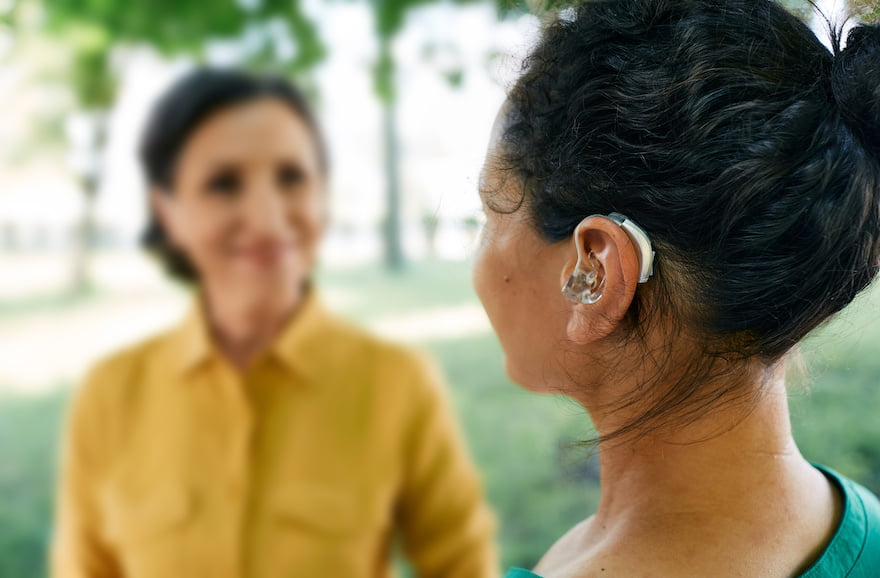Hearing loss coping strategies say downhill is the new uphill
We’ve all heard it before: no pain – no gain; can’t have a rainbow with no rain; pain is the fuel to your fame etc., etc. Great news: We’re proud to say your hearing health journey may be one of the few areas in life where you shouldn’t accept an uphill battle.

Double down into our era of work smarter, not harder, and take on the absolution in these strategies for coping with hearing loss. We promise they’ll pave the path of least resistance.
Emotional impact
Social implications: Partying hard to hardly partying
Humans are communal creatures, so effective communication is a fundamental aspect of human interaction. Hearing loss can result in misunderstandings, missed information, and difficulties with self-expression, leading to frustration and strained relationships and reducing the overall quality of life.
When it’s challenging to communicate effectively, it’s common for individuals to start avoiding social situations to prevent the frustration of being unable to hear or participate in conversations, causing the condition to progress into social isolation.
Untreated hearing loss: When mental health bears the load
We are what we surround ourselves with, and as such, when our social circumstance becomes void, our mental health bears the load. Internalizing the external predicament, the aforementioned sense of isolation, exclusion and difficulty in communication can contribute to the development of depression and anxiety due to feelings of inadequacy or a fear of being misunderstood.
Moreover, a growing body of research suggests a strong link between hearing loss and cognitive decline, including conditions like dementia and Alzheimer’s disease. Because healthy hearing provides consistent auditory stimulation to the brain, keeping those pathways active and engaged, hearing loss can dull or strain cognitive resources as the brain works harder to process incomplete or distorted sounds.
Coping strategies
Hearing aids: Change your hearing – not your presence
Because of hearing aids and assistive listening devices, reduced hearing doesn’t equal reduced participation. Hearing aids can significantly improve your ability to hear and communicate as they prioritize and amplify speech frequencies, making it easier to understand conversations, especially in noisy or chaotic environments. Additionally, by providing auditory input that the brain can process, hearing aids can support the brain’s plasticity and adaptability, potentially helping to preserve cognitive function.
Think of hearing aids like an extroverted best friend helping you stay connected with friends, family, and social activities by allowing you to actively participate in conversations and gatherings.
Stylizing your socializing: Give them a sign
Take control of hearing loss’s impact by taking control of your socialization. Examples of this include using visual cues and gestures, conversing in bright environments, and learning to read lips, as these strategies can aid your understanding in conversations better, even in noisy environments.
Pro-tip: Whenever possible, choose quieter conversational settings, and utilize written communication methods like text messages, emails, and notes to ensure you don’t miss essential information.
Read loved ones in: Specialize their support to your hearing loss
Think of it like ASL for love languages – all relationships require awareness of how the other individual feels cared for and supported. As such, practice active communication and let others know about your hearing loss so they can ‘meet you where you are,’ so to speak, in a conversation. Ask them to face you while speaking, speak clearly and not too fast, and minimize background noise.
Most importantly, don’t hesitate to seek professional guidance from hearing care providers or hearing instrument specialists, therapists, or support groups to enhance your coping skills and improve your overall quality of life.
Pave the path for your hearing health journey
When one door closes, another one opens. We understand – it can be hard to identify when a door is truly closed. In more literal terms, hearing loss will cause harm if left untreated, so choose the option that offers the healthiest happiness.
AHIP is here to help you through the process that helps you hear. Today, this sentiment means echoing that, as with all losses, acceptance and asking for help are the most important steps on the road to recovery.
AHIP is not and shall not be liable for any of the views expressed by the authors or advertisers on the Signal Blogs. The authors’ opinions and the advertisers’ content do not necessarily reflect AHIP’s views.



